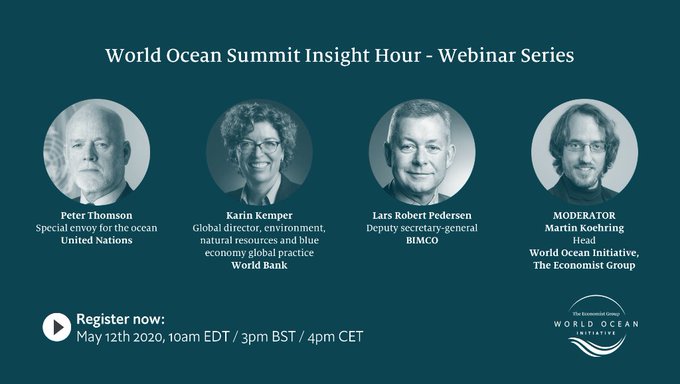The World Trade Organisation expects global trade to fall by up to a third in 2020 as covid-19 disrupts supply chains, economic activity and life around the world. The effects on the ocean economy are profound.
The pandemic has disrupted key ocean industries such as shipping, fisheries and tourism. It also threatens to slow progress in areas that are vital for building a sustainable ocean economy, such as investment in ocean-based renewable energy, shipping decarbonisation and sustainable aquaculture.
Policymakers and business leaders are starting to focus on the post-coronavirus economic recovery amid calls to put sustainable development at its heart. With countries eager to return to growth as soon as possible, there are concerns that the opportunity for a “green-blue recovery” may not materialise.
Coronavirus recovery should ‘build back bluer’
On Tuesday May 12th I moderated a fantastic panel discussion on the post-coronavirus ocean economy. Key questions addressed were as follows:
- How is the pandemic affecting plans to build a sustainable ocean economy?
- Will the global economy return to “business as usual” when pandemic-related restrictions ease? What would this mean for the long-term transition to a sustainable ocean economy?
- How can ocean stakeholders restore momentum in advancing the blue economy?
Speakers included Peter Thomson, UN special envoy for the ocean; Karin Kemper, global environment director at the World Bank; and Lars Robert Pedersen, deputy secretary-general of ship-owners association BIMCO.
The panel discussed how government plans to stimulate economic recovery from the covid-19 pandemic could support growth and employment in the sustainable ocean economy.
The full webinar recording is below:
A summary article on the webinar is here.
On May 28th, the next World Ocean Summit Insight Hour will discuss The future of seafood: How can we feed the world?
The World Ocean Summit is scheduled to take place in Lisbon on March 2nd-4th 2021.
More posts on the ocean economy:
- Moderating a keynote and panel discussion at Oceanology International
- Moderating several sessions at the World Ocean Summit in Montréal
- Ocean Observation is Financial Infrastructure
- Blue Finance for Urban Coastal Resilience: From Narrative to Structure
- Speaking about blue financing for urban coastal resilience at Mumbai Climate Week

